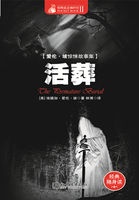I PASS over all that happened at school, until the anniversary of my birthday came round in March. Except that Steerforth was more to be admired than ever, I remember nothing. He was going away at the end of the half-year, if not sooner, and was more spirited and independent than before in my eyes, and therefore more engaging than before; but beyond this I remember nothing. The great remembrance by which that time is marked in my mind, seems to have swallowed up all lesser recollections, and to exist alone.
It is even difficult for me to believe that there was a gap of full two months between my return to Salem House and the arrival of that birthday. I can only understand that the fact was so, because I know it must have been so; otherwise I should feel convinced that there was no interval, and that the one occasion trod upon the other's heels.
How well I recollect the kind of day it was! I smell the fog that hung about the place; I see the hoar frost, ghostly, through it; I feel my rimy hair fall clammy on my cheek; I look along the dim perspective of the schoolroom, with a sputtering candle here and there to light up the foggy morning, and the breath of the boys wreathing and smoking in the raw cold as they blow upon their fingers, and tap their feet upon the floor. It was after breakfast, and we had been summoned in from the playground, when Mr. Sharp entered and said:
'David Copperfield is to go into the parlour.'
I expected a hamper from Peggotty, and brightened at the order. Some of the boys about me put in their claim not to be forgotten in the distribution of the good things, as I got out of my seat with great alacrity.
'Don't hurry, David,'said Mr. Sharp.'There's time enough, my boy, don't hurry.'
I might have been surprised by the feeling tone in which he spoke, if I had given it a thought; but I gave it none until afterwards. I hurried away to the parlour; and there I found Mr. Creakle, sitting at his breakfast with the cane and a newspaper before him, and Mrs. Creakle with an opened letter in her hand. But no hamper.
'David Copperfield,'said Mrs. Creakle, leading me to a sofa, and sitting down beside me.'I want to speak to you very particularly. I have something to tell you, my child.'
Mr. Creakle, at whom of course I looked, shook his head without looking at me, and stopped up a sigh with a very large piece of buttered toast.
'You are too young to know how the world changes every day,'said Mrs. Creakle,'and how the people in it pass away. But we all have to learn it, David; some of us when we are young, some of us when we are old, some of us at all times of our lives.'
I looked at her earnestly.
'When you came away from home at the end of the vacation,'said Mrs. Creakle, after a pause,'were they all well?'After another pause,'Was your mama well?'
I trembled without distinctly knowing why, and still looked at her earnestly, making no attempt to answer.
'Because,'said she,'I grieve to tell you that I hear this morning your mama is very ill.'
A mist rose between Mrs. Creakle and me, and her figure seemed to move in it for an instant. Then I felt the burning tears run down my face, and it was steady again.
'She is very dangerously ill,'she added.
I knew all now.
'She is dead.'
There was no need to tell me so. I had already broken out into a desolate cry, and felt an orphan in the wide world.
She was very kind to me. She kept me there all day, and left me alone sometimes; and I cried, and wore myself to sleep, and awoke and cried again. When I could cry no more, I began to think; and then the oppression on my breast was heaviest, and my grief a dull pain that there was no ease for.
And yet my thoughts were idle; not intent on the calamity that weighed upon my heart, but idly loitering near it. I thought of our house shut up and hushed. I thought of the little baby, who, Mrs. Creakle said, had been pining away for some time, and who, they believed, would die too. I thought of my father's grave in the churchyard, by our house, and of my mother lying there beneath the tree I knew so well. I stood upon a chair when I was left alone, and looked into the glass to see how red my eyes were, and how sorrowful my face. I considered, after some hours were gone, if my tears were really hard to flow now, as they seemed to be, what, in connexion with my loss, it would affect me most to think of when I drew near home—for I was going home to the funeral. I am sensible of having felt that a dignity attached to me among the rest of the boys, and that I was important in my affliction.
If ever child were stricken with sincere grief, I was. But I remember that this importance was a kind of satisfaction to me, when I walked in the playground that afternoon while the boys were in school. When I saw them glancing at me out of the windows, as they went up to their classes, I felt distinguished, and looked more melancholy, and walked slower. When school was over, and they came out and spoke to me, I felt it rather good in myself not to be proud to any of them, and to take exactly the same notice of them all, as before.
I was to go home next night; not by the mail, but by the heavy night-coach, which was called the Farmer, and was principally used by country-people travelling short intermediate distances upon the road. We had no story-telling that evening, and Traddles insisted on lending me his pillow. I don't know what good he thought it would do me, for I had one of my own: but it was all he had to lend, poor fellow, except a sheet of letter-paper full of skeletons; and that he gave me at parting, as a soother of my sorrows and a contribution to my peace of mind.
I left Salem House upon the morrow afternoon. I little thought then that I left it, never to return. We travelled very slowly all night, and did not get into Yarmouth before nine or ten o'clock in the morning. I looked out for Mr. Barkis, but he was not there; and instead of him a fat, short-winded, merry-looking, little old man in black, with rusty little bunches of ribbons at the knees of his breeches, black stockings, and a broad-brimmed hat, came puffing up to the coach window, and said:
'Master Copperfield?'
'Yes, sir.'
'Will you come with me, young sir, if you please,'he said, opening the door,'and I shall have the pleasure of taking you home.'
I put my hand in his, wondering who he was, and we walked away to a shop in a narrow street, on which was written OMER, DRAPER, TAILOR, HABERDASHER, FUNERAL FURNISHER, &c. It was a close and stifling little shop; full of all sorts of clothing, made and unmade, including one window full of beaver-hats and bonnets. We went into a little back-parlour behind the shop, where we found three young women at work on a quantity of black materials, which were heaped upon the table, and little bits and cuttings of which were littered all over the floor. There was a good fire in the room, and a breathless smell of warm black crape—I did not know what the smell was then, but I know now.
The three young women, who appeared to be very industrious and comfortable, raised their heads to look at me, and then went on with their work. Stitch, stitch, stitch. At the same time there came from a workshop across a little yard outside the window, a regular sound of hammering that kept a kind of tune: RAT—tat-tat, RAT—tat-tat, RAT—tat-tat, without any variation.
'Well,'said my conductor to one of the three young women.'How do you get on, Minnie?'
'We shall be ready by the trying-on time,'she replied gaily, without looking up.'Don't you be afraid, father.'
Mr. Omer took off his broad-brimmed hat, and sat down and panted. He was so fat that he was obliged to pant some time before he could say:
'That's right.'
'Father!'said Minnie, playfully.'What a porpoise you do grow!'
'Well, I don't know how it is, my dear,'he replied, considering about it.'I am rather so.'
'You are such a comfortable man, you see,'said Minnie.'You take things so easy.'
'No use taking 'em otherwise, my dear,'said Mr. Omer.
'No, indeed,'returned his daughter.'We are all pretty gay here, thank Heaven! Ain't we, father?'
'I hope so, my dear,'said Mr. Omer.'As I have got my breath now, I think I'll measure this young scholar. Would you walk into the shop, Master Copperfield?'
I preceded Mr. Omer, in compliance with his request; and after showing me a roll of cloth which he said was extra super, and too good mourning for anything short of parents, he took my various dimensions, and put them down in a book. While he was recording them he called my attention to his stock in trade, and to certain fashions which he said had'just come up', and to certain other fashions which he said had'just gone out'.
'And by that sort of thing we very often lose a little mint of money,'said Mr. Omer.'But fashions are like human beings. They come in, nobody knows when, why, or how; and they go out, nobody knows when, why, or how. Everything is like life, in my opinion, if you look at it in that point of view.'
I was too sorrowful to discuss the question, which would possibly have been beyond me under any circumstances; and Mr. Omer took me back into the parlour, breathing with some difficulty on the way.
He then called down a little break-neck range of steps behind a door:'Bring up that tea and bread-and-butter!'which, after some time, during which I sat looking about me and thinking, and listening to the stitching in the room and the tune that was being hammered across the yard, appeared on a tray, and turned out to be for me.
'I have been acquainted with you,'said Mr. Omer, after watching me for some minutes, during which I had not made much impression on the breakfast, for the black things destroyed my appetite,'I have been acquainted with you a long time, my young friend.'
'Have you, sir?'
'All your life,'said Mr. Omer.'I may say before it. I knew your father before you. He was five foot nine and a half, and he lays in five-and-twen-ty foot of ground.'
'RAT—tat-tat, RAT—tat-tat, RAT—tat-tat,'across the yard.
'He lays in five and twenty foot of ground, if he lays in a fraction,'said Mr. Omer, pleasantly.'It was either his request or her direction, I forget which.'
'Do you know how my little brother is, sir?'I inquired.
Mr. Omer shook his head.
'RAT—tat-tat, RAT—tat-tat, RAT—tat-tat.'
'He is in his mother's arms,'said he.
'Oh, poor little fellow! Is he dead?'
'Don't mind it more than you can help,'said Mr. Omer.'Yes. The baby's dead.'
My wounds broke out afresh at this intelligence. I left the scarcely-tasted breakfast, and went and rested my head on another table, in a corner of the little room, which Minnie hastily cleared, lest I should spot the mourning that was lying there with my tears. She was a pretty, good-natured girl, and put my hair away from my eyes with a soft, kind touch; but she was very cheerful at having nearly finished her work and being in good time, and was so different from me!
Presently the tune left off, and a good-looking young fellow came across the yard into the room. He had a hammer in his hand, and his mouth was full of little nails, which he was obliged to take out before he could speak.
'Well, Joram!'said Mr. Omer.'How do you get on?'
'All right,'said Joram.'Done, sir.'
Minnie coloured a little, and the other two girls smiled at one another.
'What! you were at it by candle-light last night, when I was at the club, then? Were you?'said Mr. Omer, shutting up one eye.
'Yes,'said Joram.'As you said we could make a little trip of it, and go over together, if it was done, Minnie and me—and you.'
'Oh! I thought you were going to leave me out altogether,'said Mr. Omer, laughing till he coughed.
'—As you was so good as to say that,'resumed the young man,'why I turned to with a will, you see. Will you give me your opinion of it?'
'I will,'said Mr. Omer, rising.'My dear'; and he stopped and turned to me:'would you like to see your—'
'No, father,'Minnie interposed.
'I thought it might be agreeable, my dear,'said Mr. Omer.'But perhaps you're right.'
I can't say how I knew it was my dear, dear mother's coffin that they went to look at. I had never heard one making; I had never seen one that I know of.—but it came into my mind what the noise was, while it was going on; and when the young man entered, I am sure I knew what he had been doing.
The work being now finished, the two girls, whose names I had not heard, brushed the shreds and threads from their dresses, and went into the shop to put that to rights, and wait for customers. Minnie stayed behind to fold up what they had made, and pack it in two baskets. This she did upon her knees, humming a lively little tune the while. Joram, who I had no doubt was her lover, came in and stole a kiss from her while she was busy (he didn't appear to mind me, at all), and said her father was gone for the chaise, and he must make haste and get himself ready. Then he went out again; and then she put her thimble and scissors in her pocket, and stuck a needle threaded with black thread neatly in the bosom of her gown, and put on her outer clothing smartly, at a little glass behind the door, in which I saw the reflection of her pleased face.
All this I observed, sitting at the table in the corner with my head leaning on my hand, and my thoughts running on very different things. The chaise soon came round to the front of the shop, and the baskets being put in first, I was put in next, and those three followed. I remember it as a kind of half chaise-cart, half pianoforte-van, painted of a sombre colour, and drawn by a black horse with a long tail. There was plenty of room for us all.
I do not think I have ever experienced so strange a feeling in my life (I am wiser now, perhaps) as that of being with them, remembering how they had been employed, and seeing them enjoy the ride. I was not angry with them; I was more afraid of them, as if I were cast away among creatures with whom I had no community of nature. They were very cheerful. The old man sat in front to drive, and the two young people sat behind him, and whenever he spoke to them leaned forward, the one on one side of his chubby face and the other on the other, and made a great deal of him. They would have talked to me too, but I held back, and moped in my corner; scared by their love-making and hilarity, though it was far from boisterous, and almost wondering that no judgement came upon them for their hardness of heart.
So, when they stopped to bait the horse, and ate and drank and enjoyed themselves, I could touch nothing that they touched, but kept my fast unbroken. So, when we reached home, I dropped out of the chaise behind, as quickly as possible, that I might not be in their company before those solemn windows, looking blindly on me like closed eyes once bright. And oh, how little need I had had to think what would move me to tears when I came back—seeing the window of my mother's room, and next it that which, in the better time, was mine!
I was in Peggotty's arms before I got to the door, and she took me into the house. Her grief burst out when she first saw me; but she controlled it soon, and spoke in whispers, and walked softly, as if the dead could be disturbed. She had not been in bed, I found, for a long time. She sat up at night still, and watched. As long as her poor dear pretty was above the ground, she said, she would never desert her.
Mr. Murdstone took no heed of me when I went into the parlour where he was, but sat by the fireside, weeping silently, and pondering in his elbow-chair. Miss Murdstone, who was busy at her writing-desk, which was covered with letters and papers, gave me her cold finger-nails, and asked me, in an iron whisper, if I had been measured for my mourning.
I said:'Yes.'
'And your shirts,'said Miss Murdstone;'have you brought 'em home?'
'Yes, ma'am. I have brought home all my clothes.'
This was all the consolation that her firmness administered to me. I do not doubt that she had a choice pleasure in exhibiting what she called her self-command, and her firmness, and her strength of mind, and her common sense, and the whole diabolical catalogue of her unamiable qualities, on such an occasion. She was particularly proud of her turn for business; and she showed it now in reducing everything to pen and ink, and being moved by nothing. All the rest of that day, and from morning to night afterwards, she sat at that desk, scratching composedly with a hard pen, speaking in the same imperturbable whisper to everybody; never relaxing a muscle of her face, or softening a tone of her voice, or appearing with an atom of her dress astray.
Her brother took a book sometimes, but never read it that I saw. He would open it and look at it as if he were reading, but would remain for a whole hour without turning the leaf, and then put it down and walk to and fro in the room. I used to sit with folded hands watching him, and counting his footsteps, hour after hour. He very seldom spoke to her, and never to me. He seemed to be the only restless thing, except the clocks, in the whole motionless house.
In these days before the funeral, I saw but little of Peggotty, except that, in passing up or down stairs, I always found her close to the room where my mother and her baby lay, and except that she came to me every night, and sat by my bed's head while I went to sleep. A day or two before the burial—I think it was a day or two before, but I am conscious of confusion in my mind about that heavy time, with nothing to mark its progress—she took me into the room. I only recollect that underneath some white covering on the bed, with a beautiful cleanliness and freshness all around it, there seemed to me to lie embodied the solemn stillness that was in the house; and that when she would have turned the cover gently back, I cried:'Oh no! oh no!'and held her hand.
If the funeral had been yesterday, I could not recollect it better. The very air of the best parlour, when I went in at the door, the bright condition of the fire, the shining of the wine in the decanters, the patterns of the glasses and plates, the faint sweet smell of cake, the odour of Miss Murdstone's dress, and our black clothes. Mr. Chillip is in the room, and comes to speak to me.
'And how is Master David?'he says, kindly.
I cannot tell him very well. I give him my hand, which he holds in his.
'Dear me!'says Mr. Chillip, meekly smiling, with something shining in his eye.'Our little friends grow up around us. They grow out of our knowledge, ma'am?'This is to Miss Murdstone, who makes no reply.
'There is a great improvement here, ma'am?'says Mr. Chillip.
Miss Murdstone merely answers with a frown and a formal bend: Mr. Chillip, discomfited, goes into a corner, keeping me with him, and opens his mouth no more.
I remark this, because I remark everything that happens, not because I care about myself, or have done since I came home. And now the bell begins to sound, and Mr. Omer and another come to make us ready. As Peggotty was wont to tell me, long ago, the followers of my father to the same grave were made ready in the same room.
There are Mr. Murdstone, our neighbour Mr. Grayper, Mr. Chillip, and I. When we go out to the door, the Bearers and their load are in the garden; and they move before us down the path, and past the elms, and through the gate, and into the churchyard, where I have so often heard the birds sing on a summer morning.
We stand around the grave. The day seems different to me from every other day, and the light not of the same colour—of a sadder colour. Now there is a solemn hush, which we have brought from home with what is resting in the mould; and while we stand bareheaded, I hear the voice of the clergyman, sounding remote in the open air, and yet distinct and plain, saying:'I am the Resurrection and the Life, saith the Lord!'Then I hear sobs; and, standing apart among the lookers-on, I see that good and faithful servant, whom of all the people upon earth I love the best, and unto whom my childish heart is certain that the Lord will one day say:'Well done.'
There are many faces that I know, among the little crowd; faces that I knew in church, when mine was always wondering there; faces that first saw my mother, when she came to the village in her youthful bloom. I do not mind them—I mind nothing but my grief—and yet I see and know them all; and even in the background, far away, see Minnie looking on, and her eye glancing on her sweetheart, who is near me.
It is over, and the earth is filled in, and we turn to come away. Before us stands our house, so pretty and unchanged, so linked in my mind with the young idea of what is gone, that all my sorrow has been nothing to the sorrow it calls forth. But they take me on; and Mr. Chillip talks to me; and when we get home, puts some water to my lips; and when I ask his leave to go up to my room, dismisses me with the gentleness of a woman.
All this, I say, is yesterday's event. Events of later date have floated from me to the shore where all forgotten things will reappear, but this stands like a high rock in the ocean.
I knew that Peggotty would come to me in my room. The Sabbath stillness of the time (the day was so like Sunday! I have forgotten that) was suited to us both. She sat down by my side upon my little bed; and holding my hand, and sometimes putting it to her lips, and sometimes smoothing it with hers, as she might have comforted my little brother, told me, in her way, all that she had to tell concerning what had happened.
'She was never well,'said Peggotty,'for a long time. She was uncertain in her mind, and not happy. When her baby was born, I thought at first she would get better, but she was more delicate, and sunk a little every day. She used to like to sit alone before her baby came, and then she cried; but afterwards she used to sing to it—so soft, that I once thought, when I heard her, it was like a voice up in the air, that was rising away.
'I think she got to be more timid, and more frightened-like, of late; and that a hard word was like a blow to her. But she was always the same to me. She never changed to her foolish Peggotty, didn't my sweet girl.'
Here Peggotty stopped, and softly beat upon my hand a little while.
'The last time that I saw her like her own old self, was the night when you came home, my dear. The day you went away, she said to me,“I never shall see my pretty darling again. Something tells me so, that tells the truth, I know.”
'She tried to hold up after that; and many a time, when they told her she was thoughtless and light-hearted, made believe to be so; but it was all a bygone then. She never told her husband what she had told me—she was afraid of saying it to anybody else—till one night, a little more than a week before it happened, when she said to him:“My dear, I think I am dying.”
'“It's off my mind now, Peggotty,”she told me, when I laid her in her bed that night.“He will believe it more and more, poor fellow, every day for a few days to come; and then it will be past. I am very tired. If this is sleep, sit by me while I sleep: don't leave me. God bless both my children! God protect and keep my fatherless boy!”
'I never left her afterwards,'said Peggotty.'She often talked to them two downstairs—for she loved them; she couldn't bear not to love anyone who was about her—but when they went away from her bed-side, she always turned to me, as if there was rest where Peggotty was, and never fell asleep in any other way.
'On the last night, in the evening, she kissed me, and said:“If my baby should die too, Peggotty, please let them lay him in my arms, and bury us together.”(It was done; for the poor lamb lived but a day beyond her.)“Let my dearest boy go with us to our resting-place,”she said,“and tell him that his mother, when she lay here, blessed him not once, but a thousand times.”'
Another silence followed this, and another gentle beating on my hand.
'It was pretty far in the night,'said Peggotty,'when she asked me for some drink; and when she had taken it, gave me such a patient smile, the dear!—so beautiful!
'Daybreak had come, and the sun was rising, when she said to me, how kind and considerate Mr. Copperfield had always been to her, and how he had borne with her, and told her, when she doubted herself, that a loving heart was better and stronger than wisdom, and that he was a happy man in hers.“Peggotty, my dear,”she said then,“put me nearer to you,”for she was very weak.“Lay your good arm underneath my neck,”she said,“and turn me to you, for your face is going far off, and I want it to be near.”I put it as she asked; and oh Davy! the time had come when my first parting words to you were true—when she was glad to lay her poor head on her stupid cross old Peggotty's arm—and she died like a child that had gone to sleep!'
Thus ended Peggotty's narration. From the moment of my knowing of the death of my mother, the idea of her as she had been of late had vanished from me. I remembered her, from that instant, only as the young mother of my earliest impressions, who had been used to wind her bright curls round and round her finger, and to dance with me at twilight in the parlour. What Peggotty had told me now, was so far from bringing me back to the later period, that it rooted the earlier image in my mind. It may be curious, but it is true. In her death she winged her way back to her calm untroubled youth, and cancelled all the rest.
The mother who lay in the grave, was the mother of my infancy; the little creature in her arms, was myself, as I had once been, hushed for ever on her bosom.















